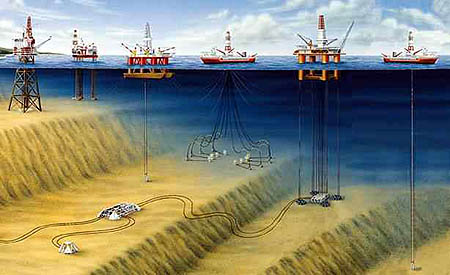ABB Stepping up R&D in the United States

ABB, the global technology company headquartered in Zurich, Switzerland, and with US headquarters in Norwalk, Connecticut, has been systematically increasing the level of research and development conducted in the USA over the past two years. In the latest step in that process, the company has designated the laboratory at ABB Vetco Gray in Houston and ABB Lummus Global in Bloomfield, New Jersey, to conduct major ABB corporate research projects.
About 1,000 people are active in R&D in the United States at the corporate or business levels of ABB, at more than a dozen sites around the country. They pursue R&D in such areas as catalysis for the petrochemical industry and in oil and gas production equipment and systems, as well as in software development, energy management systems, process automation, instrumentation, factory automation, electronics, and advanced materials.

"In addition to increasing the level of R&D at ABB's own US laboratories, we have launched a large number of advanced collaboration projects with internationally recognized US universities," said Markus Bayegan, senior corporate officer for Group R&D and Technology at ABB. "This is in line with our strategy to leverage our strengths around the world."
University projects at MIT in Boston, Carnegie Mellon in Pittsburgh, and Stanford in Palo Alto, California, encompass such emerging technologies as nanotechnology, application biotechnologies, microelectronics, robotics, software technologies, and micromechanics. ABB is also collaborating on other projects with other US universities.
In addition to the ABB Vetco Gray Laboratory and Lummus Global, there is a third ABB R&D center in the United States at Raleigh, North Carolina, ABB's Electric Systems Technology Institute, which employs 130 people, 115 of whom are graduate engineers. It focuses on several key areas of ABB's business and has been conducting R&D projects since 1991.
The ABB Vetco Gray laboratory in Houston, which focuses on high-pressure containment equipment and on processes used in oil and gas exploration and production, employs 33 people, of whom 18 are graduate engineers. The laboratory at ABB Lummus Global in Bloomfield, New Jersey, which is developing improved catalytic and petrochemical processes and new unit operation configurations and equipment, employs 45 graduate engineers.
Worldwide, ABB invested US$2.5 billion in R&D last year, about 8% of revenues, employing some 20,000 scientists and engineers. Of these, about 1,000 are active at corporate research centers in eight countries.
ABB Vetco Gray & Lummus Global
ABB Vetco Gray is the world's leading supplier of highly engineered systems, products, and services for oil and gas drilling and production, onshore and offshore. It was chosen, according to Norman Brammer, of ABB Oil, Gas, and Petrochemicals, to join Lummus Global in conducting corporate research and development primarily to meet the deepwater challenge presented by the resurgence of the US Gulf of Mexico and other deepwater provinces such as offshore Brazil and offshore West Africa.
"Houston is once again the center of the offshore industry," Brammer said, "and offshore has the most prospects for the future. Thus ABB's Total Solutions approach to the deepwater challenge is embodied in Lummus Global Offshore Systems and Vetco Gray."
ABB Oil, Gas and Petrochemicals has launched a number of research and development projects to capture the opportunities presented by the growing offshore and deepwater sector of the industry, with the intention of establishing a superior portfolio of process technologies, achieving a global leadership position in the subsea market, becoming a major player in floating production, and developing environmentally friendly production technologies, Brammer added.
"Our current development programs relate mainly to subsea production and processing," he said. "We see opportunities in subsea power distribution, novel separation systems, capital drilling equipment, downhole instrumentation and control, water and gas treatment, and flow assurance.
To explore our technology opportunities in the upstream, Brammer said ABB is focusing on a number of core competencies: process technologies, production chemistry, pressure-containing equipment, automation and control systems, electronics and instrumentation, materials, mechanical design, and lifecycle optimized systems.
"R&D is focused on subsea processing systems, including power distribution systems; deepwater subsea production systems, next generation topside main separation system; new deepwater, moored, turret-less floater; downhole control and instrumentation; deepwater capital drilling and workover systems; environmentally friendly processing systems; oilfield composites (risers and structures); and flow assurance methodologies for prediction, monitoring, and mitigation of problems in the flowing of produced fluid."
ABB Lummus Global has pre-engineered basic designs for TLPs, Mini-TLPs, DDCVs, and SCF platforms that can be modified to suit specific requirements while still reducing overall engineering cycle time and cost. These include a vertically moored, four-legged extended TLP for water depths up to 4,500 ft for small to marginal field development, a vertically moored, low hull-weight, three-legged extended TLP for the same water depth for a marginal field development, a single-column floating (SCF) platform for water depths up to 7,000 ft, with lateral mooring and a tensioned riser system, as well as conventional TLPs and deep-draft TLPs.
R&D is ongoing in advanced downhole monitoring and reservoir control in realtime for multilateral and multi-component wells to improve their production rates. Seabed processing to produce directly from the wellhead to shore is making headway (witness the SUBSIS system), but technological gaps persist in: separator technology, enhanced oil/water qualities, desanding, treatment of gas on the seafloor, gas compression on the seafloor, and development of a light, modular design.
Another major R&D project is the transfer of composites technology to oil and gas for light weight, high strength oilfield products that will change the economics of FPSOs, drillships, TLPs, and SPARs by providing light weight risers and permit operations at greater depths.
